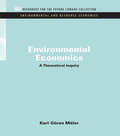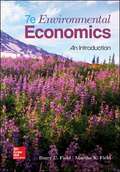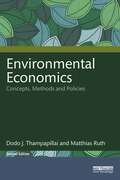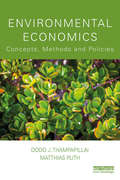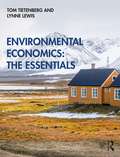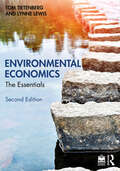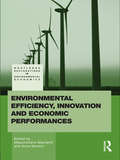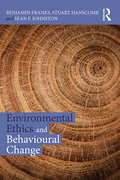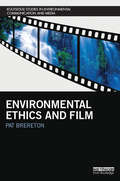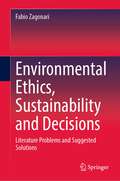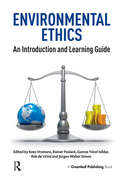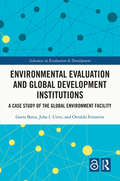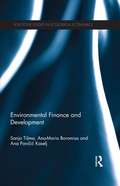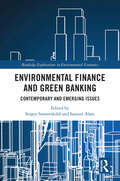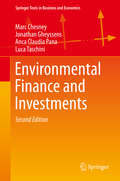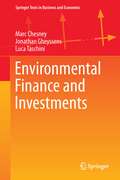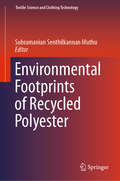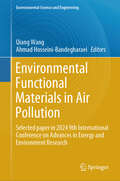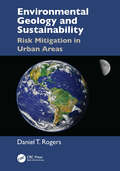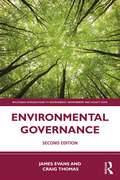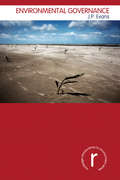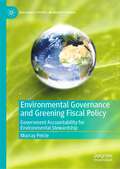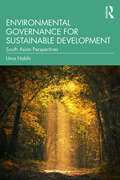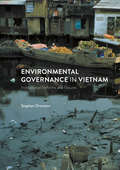- Table View
- List View
Environmental Economics: A Theoretical Inquiry (RFF Environmental and Resource Economics Set)
by Karl-Goran MalerFirst Published in 2011. Routledge is an imprint of Taylor & Francis, an informa company.
Environmental Economics: An Introduction (Seventh Edition)
by Barry C. Field Martha K. FieldEnvironmental Economics is an introduction to the basic principles of environmental economics as they have been developed in the past and as they continue to evolve. The examples discussed in this textbook represent only a sample of the full range of issues that actually exists. For this reason, the Seventh Edition sticks to the basic ideas and ways that environmental economists have found to make the basic concepts and models more specific and relevant to concrete environmental issues. The basic structure and sequence of chapters are unchanged but contain new and updated material that reflects the new research efforts by environmental economists over the last few years.
Environmental Economics: Concepts, Methods and Policies
by Matthias Ruth Dodo J. ThampapillaiEnvironmental Economics explores the ways in which economic theory and its applications, as practised and taught today, must be modified to explicitly accommodate the goal of sustainability and the vital role played by environmental capital.Pivoting around the first and second laws of thermodynamics, as well as the principles of ecological resilience, this book is divided into five key parts, which include extensive coverage of environmental microeconomics and macroeconomics. It drills down into issues and challenges including consumer demand; production and supply; market organisation; renewable and non-renewable resources; environmental valuation; macroeconomic stabilisation and international trade and globalisation. Drawing on case studies from forestry, water, soil, air quality and mining, this book will equip readers with skills that enable the analyses of environmental and economic policy issues with a specific focus on the sustainability of the economy. This new edition has been updated throughout and provides further coverage on topics such as energy transition, market organisation and the role of environmental economics in regulatory decision-making including critiques of contemporary policy directives like tradable pollution permits and net zero emissions. Challenges to achieving stabilisation and emission reduction have been expanded to include wars and conflicts such as those in the Middle East and the Russian invasion of Ukraine. This book further reinforces the premise that there are clear limits to growth and that modesty and moderation are superior alternatives.Rich in pedagogical features, including key concept boxes and review questions at the end of each chapter, this book will be a vital resource for upper-level undergraduate and postgraduate students studying not only environmental economics/ecological economics but also economics in general.
Environmental Economics: Concepts, Methods and Policies (New Horizons In Environmental Economics Ser.)
by Matthias Ruth Dodo J. ThampapillaiEnvironmental Economics explores the ways in which economic theory and its applications, as practised and taught today, must be modified to explicitly accommodate the goal of sustainability and the vital role played by environmental capital. Pivoting around the first and second laws of thermodynamics, as well as the principles of ecological resilience, this book is divided into five key parts, which includes extensive coverage of environmental microeconomics and macroeconomics. It drills down into issues and challenges including consumer demand; production and supply; market organisation; renewable and non-renewable resources; environmental valuation; macroeconomic stabilisation, and international trade and globalisation. Drawing on case studies from forestry, water, soil, air quality, and mining, this book will equip readers with skills that enable the analyses of environmental and economic policy issues with a specific focus on the sustainability of the economy. Rich in pedagogical features, including key concepts boxes and review questions at the end of each chapter, this book will be a vital resource for upperlevel undergraduate and postgraduate students studying not only environmental economics/ecological economics but also economics in general.
Environmental Economics: The Essentials
by Tom Tietenberg Lynne LewisEnvironmental Economics: The Essentials offers a policy-oriented approach to the increasingly influential field of environmental economics that is based upon a solid foundation of economic theory and empirical research. Students will not only leave the course with a firm understanding of environmental economics, but they will also be exposed to a number of case studies showing how underlying economic principles provided the foundation for specific environmental and resource policies. This key text highlights what insights can be derived from the actual experience. Key features include: Extensive coverage of the major issues including climate change, air and water pollution, sustainable development, and environmental justice; Introductions to the theory and method of environmental economics including externalities, experimental and behavioral economics, benefit-cost analysis, and methods for valuing the services provided by the environment; Boxed ‘Examples’ and ‘Debates’ throughout the text which highlight global examples and major talking points. The text is fully supported with end-of-chapter summaries, discussion questions, and self-test exercises in the book, as well as with multiple-choice questions, simulations, references, slides, and an instructor’s manual on the Companion Website. This text is adapted from the best-selling Environmental and Natural Resource Economics, 11th edition, by the same authors.
Environmental Economics: The Essentials
by Tom Tietenberg Lynne LewisEnvironmental Economics: The Essentials offers a policy-oriented approach to the increasingly influential field of environmental economics that is based on a solid foundation of economic theory and empirical research. Students will not only leave the course with a firm understanding of environmental economics, but they will also be exposed to a number of case studies showing how underlying economic principles provided the foundation for specific environmental and resource policies. This key text highlights what insights can be derived from the actual experience.Key features include: Extensive coverage of the major issues, including climate change, air and water pollution, sustainable development, and environmental justice Introductions to the theory and method of environmental economics, including externalities, experimental and behavioral economics, benefit-cost analysis, and methods for valuing the services provided by the environment Boxed Examples and Debates throughout the text, which highlight global cases and major talking points This second edition provides updated data, new studies, and more international examples. There is a considerable amount of new material, with a deeper focus on climate change. The text is fully supported with end-of-chapter summaries, discussion questions, and self-test exercises in the book, as well as a suite of supplementary digital resources, including multiple-choice questions, simulations, references, slides, and an instructor’s manual. It is adapted from the 12th edition of the best-selling Environmental and Natural Resource Economics textbook by the same authors.
Environmental Efficiency, Innovation and Economic Performances
by Massimiliano Mazzanti Anna MontiniThis book deals with the increasingly complex issues of eco-innovation. Eco-innovation is becoming a conceptual reference point for many regional and international public policies and management strategies. Since 2000, this field of research has been focusing on environmental innovation, particularly related to the intensity of emissions, and economic performance and efficiency. There are two reasons for this growing interest. The first is that environmental performance is one of the main economic policy goals of European countries thanks to its relevance to the Lisbon Strategy and the Göteborg priorities for sustainable development. The second, which is partly linked to the first, is related to the growing impact of environmental regulation on private sector activity in many European countries. This volume brings together microeconomics studies on firms’ eco and economic performance both in the industrial and service sector; by considering a sector based perspective rooted mainly in the exploitation of NAMEA data; at regional level, and a macroeconomic analysis of the environment, income and welfare. This collection brings together the best of recent research in the area of eco-innovation and in its entirety is an excellent source of knowledge for postgraduates and researchers students of Environmental and Ecological Economics alike. As well as fully developing the theoretical aspects of its topics, these essays are also strongly policy-oriented and will be of interest to anyone seeking information an applied perspective.
Environmental Ethics and Behavioural Change
by Sean F. Johnston Stuart Hanscomb Benjamin FranksEnvironmental Ethics and Behavioural Change takes a practical approach to environmental ethics with a focus on its transformative potential for students, professionals, policy makers, activists, and concerned citizens. Proposed solutions to issues such as climate change, resource depletion and accelerating extinctions have included technological fixes, national and international regulation and social marketing. This volume examines the ethical features of a range of communication strategies and technological, political and economic methods for promoting ecologically responsible practice in the face of these crises. The central concern of the book is environmental behaviour change: inspiring, informing and catalysing reflective change in the reader, and in their ability to influence others. By making clear the forms of environmental ethics that exist, and what each implies in terms of individual and social change, the reader will be better able to formulate, commit to, articulate and promote a coherent position on how to understand and engage with environmental issues. This is an essential companion to environmental ethics and philosophy courses as well as a great resource for professionals interested in practical approaches to environmental ethics. It is also excellent supplementary reading for environmental studies, environmental politics and sustainable consumption courses.
Environmental Ethics and Film (Routledge Studies in Environmental Communication and Media)
by Pat BreretonEnvironmental ethics presents and defends a systematic and comprehensive account of the moral relation between human beings and their natural environment and assumes that human behaviour toward the natural world can and is governed by moral norms. In contemporary society, film has provided a powerful instrument for the moulding of such ethical attitudes. Through a close examination of the medium, Environmental Ethics and Film explores how historical ethical values can be re-imagined and re-constituted for more contemporary audiences. Building on an extensive back-catalogue of eco-film analysis, the author focuses on a diverse selection of contemporary films which target audiences’ ethical sensibilities in very different ways. Each chapter focuses on at least three close readings of films and documentaries, examining a wide range of environmental issues as they are illustrated across contemporary Hollywood films. This book is an invaluable resource for students and scholars of environmental communication, film studies, media and cultural studies, environmental philosophy and ethics.
Environmental Ethics, Sustainability and Decisions: Literature Problems and Suggested Solutions
by Fabio ZagonariThis book provides a summary of the main concepts involved in environmental ethics, sustainability and decisions and a consistent sequence of environmental ethics, sustainability and decisions. It presents many environmental ethics, by focusing on maximising welfare within teleological approaches and minimising inequalities within deontological approaches. It presents many sustainability paradigms, by focusing on weak sustainability to maximise welfare and strong sustainability to minimise inequalities. Two main decisions are presented by focusing on policies (taxes, standards, subsidies, permits, protected areas, exploitation rights) and projects (CBA) towards efficiency to maximise welfare and policies (national laws/regulations, bilateral/multilateral agreements) and projects (MCA) towards equity to minimise inequalities.
Environmental Ethics: An Introduction and Learning Guide
by Kees Vromans Rainer Paslack Gamze Yücel Isildar Rob De Vrind Jürgen Walter SimonAs the destructive consequences of environmental problems such as global warming, water scarcity and resource and biodiversity destruction have been felt ever more heavily, people are becoming more aware of the importance of and their responsibilities towards environmental protection. The causes of our problems are anthropogenic. The number of people working in what might be termed "environmental industries" or with environmental responsibilities in their day-to-day work has mushroomed. In many cases, however, individuals charged with protecting the environment have a set of empirical priorities: what *is* done, rather than moral priorities which consider what *should* be done. The need to harmonize environmental knowledge with ethical behaviour and thus achieve behavioural change and the internalization of environmentally ethical values has never been more urgent. This book, developed as part of an EU programme to diffuse the application of environmental ethics to decision-making on pollution control, is a response to the need for a restatement of environmental ethics and for a code of behaviour and set of values that can be internalised and adopted to guide the actions by individuals at the sharp end of protecting the environment: decision-makers and environmental experts/executives/staff working in municipalities and public/government organisations throughout the EU and Turkey. It is nothing short of an ethical training manual that will guide environmental experts/decision-makers in making sound judgements and decisions and will act as a bridge between environmental knowledge and environmental behaviour. The book will be essential reading for decision-makers and experts working in local authorities and governmental organisations with responsibility for environmental protection: for both graduate and postgraduate students in environment-related disciplines and for vocational education teachers with a focus on the environment.
Environmental Evaluation and Global Development Institutions: A Case Study of the Global Environment Facility (Advances in Evaluation & Development)
by Juha I. Uitto Osvaldo N. Feinstein Geeta BatraEvaluation is increasingly important for finding sustainable solutions for the people and the planet, based on a systematic analysis of what works, for whom, and under what circumstances, and to contribute to the achievement of the Sustainable Development Goals, as they pertain to the environment. This book explores why the Global Environment Facility (GEF) invests in evaluation for accountability and learning to inform its decision-making on programming priorities, and how this leads to wiser funding decisions and better program performance on the ground. The book is based on real-life experiences of how to make evaluation count for international environmental action. Drawing upon comprehensive evaluations of the GEF, it provides unique insights from authors responsible for designing, implementing, and disseminating the findings of the evaluations. No other multilateral development or environment agency places evaluation fully at the center of their decision-making. The book outlines the trends in the global environment and the changing landscape of international environmental finance. It defines the role of the GEF and explains its institutional framework and the unique partnership that involves donor and recipient countries, multilateral development banks, UN agencies, nongovernmental organizations (NGOs), and national agencies in the developing countries. Further, it provides useful pointers to other organizations wishing to enhance evidence-based decision-making for improving their relevance, performance, and impact. The book will be most suitable for graduate-level, specialized study in a variety of disciplines such as environmental and development economics, political science, international relations, geography, sociology, and social anthropology.
Environmental Finance and Development (Routledge Studies In Ecological Economics Ser. #23)
by Sanja Tišma Ana Marija Boromisa Ana Pavičić KaseljThis book focuses on environmental financing in the process of alignment with the EU. Based on comparative analysis of national environmental strategies and financial needs, and their links with strategic development documents in five selected countries (Bulgaria, Romania, Slovenia, Croatia, Turkey) the book identifies main achievements and remaining challenges in the main areas of environmental regulation: nature protection, water, waste, air and climate change. For each area the same concept is applied: current situation is presented, followed by an overview of institutional and legal frameworks. Division of competences between actors at the same or at different levels is addressed. Costs of implementation are estimated and possible sources of financing identified.
Environmental Finance and Green Banking: Contemporary and Emerging Issues (Routledge Explorations in Environmental Economics)
by Sergey Sosnovskikh and Samsul AlamEnvironmental finance and green banking are central drivers of the transition to a sustainable economy and essential components in solutions to climate change. This book presents the latest research on theory and practices in these interdisciplinary fields, incorporating both public and corporate finance. It introduces three parts – environmental investing and financing, green banking and environmental policies in the public sector. The book explores the current trends, dynamics and ways forward for environmental finance and green banking, including fundamental theories (e.g., environmental Kuznets curve) and comparisons between traditional and green bond efficiency, corporate governance practices and disclosure, green central banking, climate finance, sustainable strategies, green Islamic banking, and public climate fund management in multi-country contexts. The contributors to this book highlight significant challenges ahead while recognizing potential opportunities, such as the revolution in green investments and trading in green bonds. This book is a welcome addition to the literature on environmental economics and finance and the economics of sustainability and climate change.
Environmental Finance and Investments
by Jonathan Gheyssens Marc Chesney Luca Taschini Anca Claudia PanaThis textbook provides an introduction to environmental finance and investments. The current situation raises fundamental questions that this book aims to address. Under which conditions could carbon pricing schemes contribute to a significant decrease in emissions? What are the new investment strategies that the Kyoto Protocol and the emerging carbon pricing schemes around the world should promote? In the context of carbon regulation through emission trading schemes, what is the trade-off between production, technological changes, and pollution? What is the nature of the relation between economic growth and the environment? This book intends to provide students and practitioners with the knowledge and the theoretical tools necessary to answer these and other related questions in the context of the so-called environmental finance theory. This is a new research strand that investigates the economic, financial, and managerial impacts of carbon pricing policies.
Environmental Finance and Investments
by Jonathan Gheyssens Marc Chesney Luca TaschiniThe current economic and environmental situation poses fundamental questions that this book aims to answer: Under which conditions could a market-based approach contribute to a decrease in emissions? How are abatement and investment strategies generated or promoted under permit regimes like the European Union Emission Trading Scheme (EU ETS)? In the context of the EU ETS, what is the trade-off between production, technological changes and pollution? This book is intended to provide students and practitioners the knowledge and theoretical tools they need in order to answer these and other more general questions in the context of so-called environmental finance theory, a new field of research that investigates the economic, financial and managerial impacts of market-based environmental policies.
Environmental Footprints of Recycled Polyester (Textile Science and Clothing Technology)
by Subramanian Senthilkannan MuthuThis book examines the environmental footprints of recycled polyesters, highlighting the benefits and impact of recycling polyester waste and preparing it to replace virgin polyester in the raw material stage. It also discusses the importance of recycled polyester as a sustainable raw material in textile production.
Environmental Functional Materials in Air Pollution: Selected paper in 2024 9th International Conference on Advances in Energy and Environment Research (Environmental Science and Engineering)
by Qiang Wang Ahmad Hosseini-BandegharaeiThis book offers readers with analysis of the main causes of air pollution and related functional materials application and research.Air, as the primary element on which human life depends, directly impacts human living and health. However, a 2022 report from the World Health Organization indicated that "the air nearly the entire global population (99%) breathes exceeds WHO air quality limits, threatening their health". Currently, the main approaches to air pollution involve source control and the treatment of air pollutants, with significant emphasis on the research and application of functional materials.With the development of material science, an increasing number of high-performance materials have been introduced into the field of air pollution control and have achieved good results. For instance, nanocomposite materials and bio-based materials. In addition, novel sensing materials have also enabled us to monitor air pollution more stably and accurately, especially for specific pollutants. Moreover, they play a crucial role in understanding the distribution, sources, and trends of pollution.It provides engineers and researchers in the field of air pollution control with research findings related to this area and the corresponding functional materials. It aims to share specific and valuable knowledge and content to improve air pollution control efforts.
Environmental Geology and Sustainability: Risk Mitigation in Urban Areas
by Daniel T. RogersThis book explains the role of geology as the basis of sustainability. It discusses how humans have altered natural balances and the unique dimensions that geology brings to understanding sustainability. Focused on humans’ activities in shaping urban areas, this book helps readers identify natural geologic risks created, identify human actions that reduce or increase those risks, or create new risks with unintended negative environmental consequences. It provides sustainability-oriented solutions so that humans can live in harmony with nature.Features: The first book to identify and describe geology as the foundation of sustainability. Provides the history and reasoning why geology is important to achieve sustainability and environmental stewardship. Goes beyond identifying natural geological and anthropogenic-induced risks by providing numerous case studies and potential solutions. Includes an overview of natural geologic and anthropogenic-induced impacts in major cities across the world. Examines where environmental regulations in many countries of the world have succeeded or failed and lists those areas where new sustainability-oriented environmental regulations are needed worldwide. This textbook is for senior undergraduate and graduate students taking courses in environmental geology, Earth science and sustainability, urban planning, and environmental risk analysis. It also serves as an insightful reference for professionals, researchers, and academics in these fields.
Environmental Governance (Routledge Introductions to Environment: Environment and Society Texts)
by Craig Thomas James EvansClimate change is prompting an unprecedented questioning of the fundamental bases upon which society is founded. Businesses claim that technology can save the environment, while politicians champion the role of international environmental agreements to secure global action. Economists suggest that we should pay developing countries not to destroy their forests, while environmentalists question whether we can solve ecological problems with the same thinking that created them. As the process of steering society, governance has a critical role to play in coordinating these disparate voices and securing collective action to achieve a more sustainable future. Environmental Governance is the only book to discuss the first principles of governance, while also providing a critical overview of the wide-ranging theories and approaches that underpin policy and practice today. It places governance within its wider political context to explore how the environment is controlled, manipulated, regulated and contested by a range of actors and institutions. This book shows how network and market governance have shaped current approaches to environmental issues, while also introducing approaches such as transition management and adaptive governance. In so doing, it highlights the strengths and weaknesses of the different approaches currently in play, and considers their political implications. This second edition has been comprehensively updated to build upon the success of the acclaimed first edition, with a new chapter on the environmental governance of outer space and updated analysis of international climate change summits. It provides a ground-breaking overview of dominant and emerging approaches of environmental governance, forging critical links between them. Each chapter has been updated with new case studies, key debates and figures, and includes questions for discussion and further reading. It is essential reading for students of the environment, politics and sociology, and, indeed, anyone concerned with changing society to secure a more sustainable future.
Environmental Governance (Routledge Introductions to Environment: Environment and Society Texts)
by J. P. EvansClimate change is prompting an unprecedented questioning of the fundamental bases upon which society is founded. Businesses claim that technology can save the environment, while politicians champion the role of international environmental agreements to secure global action. Economists suggest that we should pay developing countries not to destroy their forests, while environmentalists question whether we can solve ecological problems with the same thinking that created them. As the process of steering society, governance has a critical role to play in coordinating these disparate voices and securing collective action to achieve a more sustainable future. Environmental Governance is the only book to discuss the first principles of governance, while also providing a critical overview of the wide ranging theories and approaches that underpin policy and practice today. It places governance within its wider political context to explore how the environment is controlled, manipulated, regulated, and contested by a range of actors and institutions. This book shows how network and market governance have shaped current approaches to environmental issues, while also introducing emerging approaches such as transition management and adaptive governance. In so doing, it highlights the strengths and weaknesses of the different approaches currently in play, and considers their political implications. This text provides a groundbreaking overview of dominant and emerging approaches of environmental governance, drawing on cutting edge debates and forging critical links between them. Each chapter is complemented by case studies, key debates, questions for discussion and further reading. It is essential reading for students of the environment, politics and sociology, and, indeed, anyone concerned with changing society to secure a more sustainable future.
Environmental Governance and Greening Fiscal Policy: Government Accountability for Environmental Stewardship (Palgrave Studies in Impact Finance)
by Murray PetrieThis book addresses the increasingly urgent question: How can governments be made more accountable for the quality of their environmental stewardship?It explores:Enhanced national State of the Environment reporting and integration of environmental outcomes in key national indicators.Mainstreaming environmental goals, targets, and risks by integrating them in fiscal policy and the annual budget—a government’s most important policy instrument.Promoting sustainability by progressively exposing and eliminating harmful tax and expenditure policies, putting a price on pollution, and providing environmental public goods.Civil society environmental monitoring.The book combines in-depth assessment of the latest climate/green budgeting literature and country practices with discussion of how to implement green fiscal policies. The framework is deliberately ambitious given the severity, scale, and urgency of climate change and biodiversity loss. The book will be of interest to ministry of finance, budget, and planning officials, to environment sector agencies, oversight institutions, international organizations, civil society organizations, and to academics and students in the fields of environmental studies, development studies, economics, public finance, and public policy.
Environmental Governance for Sustainable Development: South Asian Perspectives
by Uma NabhiThis book studies the role of the United Nations Environment Programme (UNEP) as an advocate for greater environmental responsibility and analyses the major achievements and outcomes of two landmark conferences – Stockholm (1972) and Rio (1992) – which set the agenda for the future role of the UNEP. It discusses the UNEP’s evolution, objectives and the problems of differing perspectives within, its ability to deal with environmental challenges, its skill in successfully carrying out the mandate and contributing to the pursuit of environmental security. The book also looks at five developing countries of South Asia, namely India, Bangladesh, Nepal, Pakistan and Sri Lanka, to study the role of the South Asia Co-operative Environment Programme (SACEP), which plays an active role in the management of environmental issues and constitutes an important landmark in regional cooperation in South Asia. The author evaluates the contributions of National Conservation Strategies not only in creating environmental awareness but also in strengthening environmental governance architecture by integrating Millennium Development Goals and Sustainable Development Goals into the development planning of these South Asian countries under study. Drawing on in-depth research and interviews, this book will be of interest to students, teachers, researchers, policymakers and strategic analysts working in the fields of environment studies, sustainable development, environmental science and policy, environmental law and governance, geography, politics and international affairs.
Environmental Governance in Vietnam
by Stephan OrtmannThis book deals with institutional reforms in response to a mounting environmental crisis in Vietnam. The author introduces the reader to the most important environmental problems that Vietnam is currently facing and shows how the emphasis on economic growth has come at the expense of the natural environment. Following an assessment of the still deteriorating environmental situation, the book develops a theoretical framework of institutional change within the political system seeking to overcome the traditionally static understanding of institutions. The empirical analysis devotes attention to the main aspects on Vietnam's environmental governance including the government, society, businesses and international organizations. The book is based on four years of empirical research including interviews with government officials and representatives of international and national non-governmental organizations, observations of meetings, official documents, and numerous Vietnamese newspaper reports. This book is directed both at academics, students, as well as development practitioners and activists. It seeks to engage those working in the fields of environmental politics, governance, and institutional change in one-party states.
